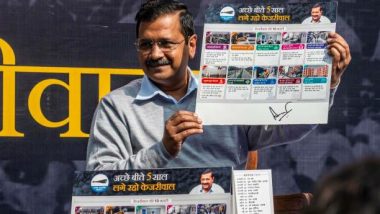New Delhi, August 29: Under the leadership of Delhi Chief Minister Arvind Kejriwal, the AAP government has decided to not increase the power tariff in Delhi for the sixth consecutive year in the state. The decision was announced on August 28 by the Delhi Electricity Regulatory Commission (DERC) regarding no hike in power tariffs in the city for 2020-21 in view of coronavirus pandemic.
Tweeting soon after the announcement was made, Arvind Kejriwal congratulated the citizens of Delhi. He said, "Congratulations to the people of Delhi. On one hand, while electricity rates are increasing year after year across the country, Delhi has not allowed the electricity rate to rise for six years and also reduced the rate in some areas. It is historic. This is happening because you formed an honest Government in Delhi."
दिल्ली की जनता को बधाई।
एक तरफ़ जहां पूरे देश में साल दर साल बिजली की दरें बढ़ रहीं हैं, दिल्ली में लगातार छट्ठे साल बिजली के दर नहीं बढ़ने दिए और कुछ क्षेत्र में दर कम भी किए।
ये एतिहासिक है। ये इसलिए हो रहा है क्योंकि आपने दिल्ली में एक ईमानदार सरकार बनाई।
— Arvind Kejriwal (@ArvindKejriwal) August 28, 2020
Due to the coronavirus pandemic, the DERC said that there will be no change in the tariff for March due to no increase in the revenue of the power distribution firms, like the BSES Rajdhani Power Ltd (BRPL), BSES Yamuna Power Ltd (BYPL), Tata Power Delhi Distribution Limited (TPDDL), and New Delhi Municipal Council (NDMC).
It is also worth mentioning that back in 2013, Arvind Kejriwal went on an indefinite hunger strike (Bijli - Paani Satyagraha) against high power tariffs. He promised to provide the cheapest electricity in the country
After coming to power with a landslide victory - Arvind Kejriwal slashed the tariffs by 50%
From 2013 to 2019 - This is our journey! We'll never forget our roots.
What started as a movement is now a benchmark of Governance
Check out the thread below! 👇👇 https://t.co/d36EZEmbVs
— AAP (@AamAadmiParty) September 27, 2019
Since then the AAP government has provided relief to the people of Delhi in terms of no increase in electricity rates. The per-unit electricity rates in other states such as Rs 3.5 up to 100 units, and Rs 4.15 on 101-200 units in Gujarat, Rs 4.49 up to 100 units and Rs 6.34 on 101-200 units in Punjab, Rs 1.5 up to 100 units and Rs 2.25 units on 101-200 units in Goa. The per-unit electricity rate in Delhi is 0 up to a consumption of 200 units, and a 50% subsidy is provided for consumption between 201-400 units.
Electricity Rates in Other States Vs Rate in Delhi
| State | 0-100 Units | 100-200 Units |
| Gujarat | Rs 3.5 | Rs 4.15 |
| Punjab | Rs 4.49 | Rs 6.34 |
| Goa | Rs 1.5 | Rs 2.25 |
| Uttarakhand | Rs 2.8 | Rs 3.75 |
| Delhi | Rs 0.0 | Rs 0.0 |
- Uttar Pradesh: Rs. 5.5 (0-150 Units) and Rs. 6 (151-200 Units).
- Delhi - Rs 0 from 0 to 200 units, 50% subsidy from 201 to 400 units.
Recently Delhi's neighbouring state, Uttar Pradesh Electricity Regulatory Commission (UPERC) announced an increase in electricity rates in the state. The power tariff has been increased from Rs 4.9 to Rs 5.5 up to 150 units, from Rs 5.4 to Rs 6 on 151-300 units, from Rs 6.2 to Rs 6.5 on 301-500 units and from Rs 6.5 to Rs 7 for consumption above 500 units.
Kejriwal had recently said that in the wake of the coronavirus lockdown, the revenue of the Delhi government has fallen from Rs 3,500 crores in April month of the previous years to Rs 300 crores in 2020. The decision to not increase the power tariff despite the fallen levels of revenue in the state has been welcomed by the people of Delhi and will provide relief to over 62 lakh consumers.
With the COVID-19 pandemic and its successive lockdown, there were cutdowns in salaries and people had also started working from home. Kejriwal has time and again stated that the AAP government is the government supporting the common people. In September 2019, around 14 lakh consumers in Delhi had received zero electricity bills. Around 26 lakh families have received zero electricity bills in the month of November-December 2019.













 Quickly
Quickly


